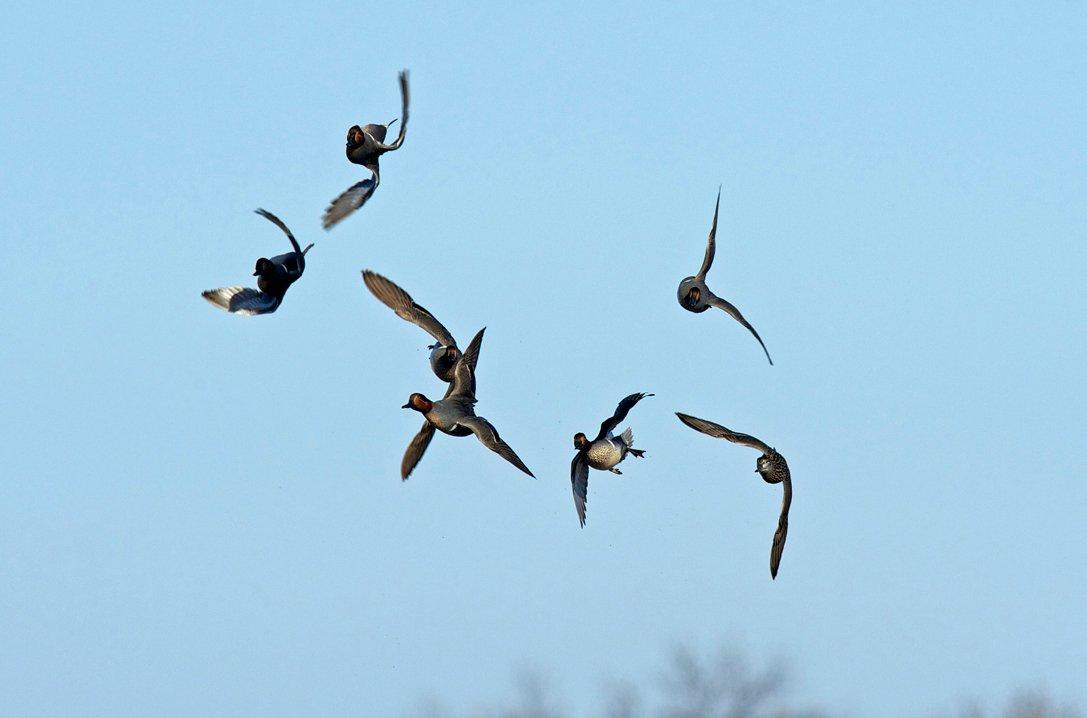Here's one hunter's view about the most difficult waterfowling target

However, some ducks are inherently more challenging to shoot than others, whether it's because of size, speed, agility or behavior patterns. Many of these birds have well-earned reputations as difficult targets, even inspiring tricky sporting clays stations that mimic their behavior. Let's compare North America's ducks head to head to see which presents the toughest target.
First, let's agree that extreme conditions and situations make any shot more difficult. A decoying bird in a howling breeze can become an adventure. Likewise, an otherwise cake crossing opportunity in timber can be a three-and-out proposition. For this argument, throw out complicating factors such as wind, lighting, cover, clothing, surprise, group situations and gun function. Also, forget about shooter form, ability and experience, and ancillary factors that make shots tough, such as having to twist hard to your right or stand in a rocking skiff. We'll just discuss ducks.
Now, to narrow the list. Toss out mallards, gadwalls, wigeon, pintails, shovelers and black ducks. Yeah, any of these birds can present a difficult target, but they're not consistently cuss-word frustrating. On the diving duck/sea duck side, cross off ruddy ducks, which fly slow and straight; scoters, which often resemble floating buses on approach; and mergansers, which are fast but usually fly fairly straight and seem to die in droves anytime someone misidentifies them (guilty). And because I've never shot eiders or harlequin ducks, I must eliminate them from the discussion.
So, we're left with wood ducks, blue-winged teal and green-winged teal on the puddler side, and canvasbacks, redheads, ringbills, buffleheads, goldeneyes, longtails and scaup (lesser and greater) in the diver/sea duck contingent. First, I'll throw out buffies. Yeah, they're small, quick and agile, but they pale a bit when compared to the wow factor of cans, ringbills, redheads and bluebills. Next, I'll eliminate longtails and goldeneyes. Both be difficult but no more so than any other diver or sea duck. They received special consideration because of their incredible toughness and sometimes seeming invulnerability to finishing shots. Both will hit the surf diving and stay underwater for long stretches after being seemingly smashed in the air. However, that's not enough to qualify them for the title.
Switching gears, I'll take woodies off the table. They're quick and have a great knack for buzzing you from behind, but they fly fairly straight and cannot match the aerobatics of teal. Bluewings and greenwings share many maddening characteristics, including twisting, turning flight patterns. But greenwings get the puddler trophy because they seem to have an extra burst, and their habit of skyrocketing straight up when spooked or shot at makes them the tougher target. Sorry bluewings. I still promise to miss you consistently this September.
Back to divers. The canvasback is often credited as being the fastest duck. True, cans are no slouch, but they're a large target and don't zig and zag as much as some other pochards. Redheads will make you crazy by dive-bombing your spreads from high altitude, and bluebills can lull you into complacency and then shift into turbo drive in a millisecond. However, all of them are a half-step behind ringbills. These smallish ducks roar in and out of your decoys like an F-16 doing a flight-line pass, and twist and dart in flight quicker than a bird half their size. Plus, like greenwings, they can hit lift-off and climb skyward faster than a bottle rocket. They win the diver subcategory.
So who's the champ? Greenwing or ringbill? Man, don't make me choose. It's like picking Brett Favre or Aaron Rodgers as your favorite Packers quarterback. Ringbills win out on straight-line speed and the oh-crap factor with crossing shots. Further, their jet-like vapor trail — yes, air rushing through their wings actually sounds similar to a jet — scores them bonus points. But ultimately, greenwings are probably a bit more agile, and they're smaller, which — at least for many people — makes them a tougher target. These tiny, colorful ducks win the crown.
You might be shaking your head at my tough-duck bracket, and that's cool. This just represents one duck hunter's opinion, and like I said, any duck can be difficult. That just increases duck hunting's challenge and appeal. So, what's your choice for the most difficult duck to shoot consistently?






